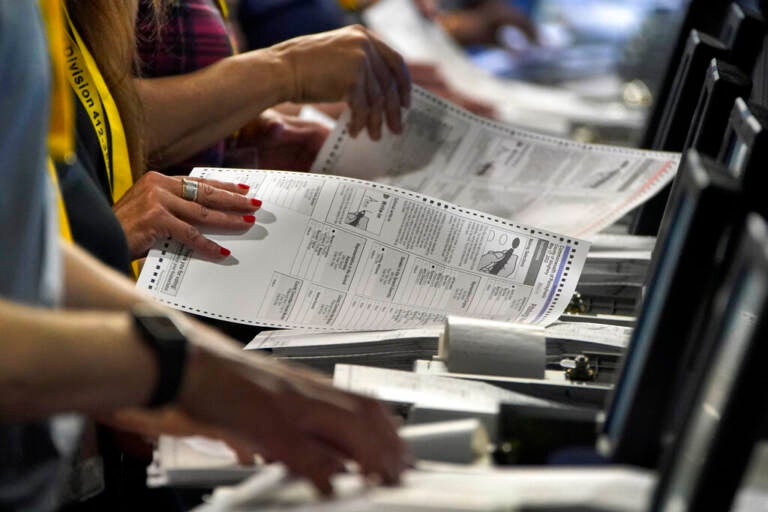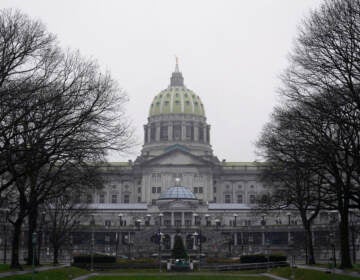Unresolved issues have Pa. election experts planning for a rough 2022 midterm
Three Pa. counties still haven’t certified their May primary balloting, and a cascade of lawsuits create uncertainty over how 2022 votes will be counted.

Election workers perform a recount of ballots from the recent Pennsylvania primary election at the Allegheny County Election Division warehouse on the Northside of Pittsburgh, June 1, 2022. (AP Photo/Gene J. Puskar, File)
Two years after Pennsylvania’s logistically rocky, litigious, and misinformation-filled 2020 election, election experts say they’re expecting more of the same in 2022.
The Nov. 8 midterms will see the commonwealth vote in hugely contentious elections for governor and U.S. Senate, and a slew of down-ballot races. Turnout will likely be at its highest point since 2020, and with abortion access and Senate control hanging in the balance, national attention — and money — is already flooding into the races.
The issues that plagued Pennsylvania’s elections two years ago are, by now, well-known.
It took counties a long time to tabulate mail ballots, and former President Donald Trump used the delay to begin sowing misinformation about widespread election fraud. It wasn’t happening, but the conviction that it was stuck around.
The 2020 election also came with a flood of litigation — much of it over the ways in which counties handled minor election administration questions. Should counties tabulate mail ballots with misspellings? Ones with a missing or incorrect date? Ones missing an inner envelope? What about ballots that arrived late due to postal service delays? That litigation kept results in limbo even longer.
In the two years since, county and state administrators and election experts have mostly agreed on the best ways to make sure those problems don’t happen again. Two of the most common solutions are changing state law to give counties more time to tabulate ballots, and to clarify exactly which ballots should and shouldn’t be counted.
Despite the state legislature spending a lot of time in the past two years discussing elections, however, those things haven’t happened.
Al Schmidt, a former Republican City Commissioner for Philadelphia who now heads the good government group Committee of Seventy, said it’s been frustrating. And he thinks the outcome is going to be predictable: another cycle of delays and baseless fraud claims.
“Just as I knew it was coming in 2020, we’re going to see it again,” he said. “The legislature knows it, and they’re not doing a damn thing to fix it.”
The perennial pre-canvassing problem
Pennsylvania law requires that counties begin processing mail ballots no sooner than 7 a.m. on Election Day.
Before the commonwealth legalized no-excuse mail voting in 2019, this wasn’t an issue — the entire state only got about 300,000 absentee ballots in 2016. But under the newly expanded law in 2020, the number of mail ballots skyrocketed to more than 2.6 million.
That meant counties were suddenly scrambling to count piles and piles of mail ballots while also administering in-person voting — something that leaves them essentially “trying to run two elections on Election Day,” according to Lisa Schaefer, who heads the County Commissioners Association of Pennsylvania.
“That’s not a good way for us to manage our resources,” she said.
Neither party in the legislature really opposes pre-canvassing, which would mean allowing counties to start processing — not actually counting — ballots ahead of Election Day. Many other states do it.
But the GOP-controlled House and Senate have refused to pass that bill alone.
In their most notable attempt to update election law, Republican lawmakers wrapped a pre-canvassing provision into a sweeping measure that would have also tightened deadlines for absentee ballot applications and required all voters to present a form of ID.
Democratic Gov. Tom Wolf said he believed those measures would disenfranchise voters, and vetoed the bill. There hasn’t been a serious attempt to pass a similar measure since.
Schmidt, the former Philly commissioner, said he thinks the pre-canvassing issue is more than a logistical headache. It creates delays in results, he said, that create “a window of opportunity for bad faith actors to discredit the election results.”
He experienced this firsthand in 2020. One conspiracy theory that spiraled out of Trump’s claims he had won the election, Schmidt recalled, was “that truckloads of counterfeit Chinese ballots were being smuggled into our tabulation center by South Philly Italian organized crime figures.”
It was ridiculous, but theories like this inspired action. Two heavily armed Virginia men showed up outside Philadelphia’s ballot-counting center, allegedly believing that fake ballots were being counted.
“That was completely fictitious, but it still motivates people to do bad things,” Schmidt said.
Rogue counties
It has now been two months since the primary election, and Pennsylvania’s Department of State is in a stalemate with three of Pennsylvania’s 67 counties over certifying election results.
At issue are undated mail ballots.
These ballots were delivered to county election offices on time and are valid, except they’re missing a date on their outer envelope. State law requires these dates, but a federal appeals court ruled recently that tossing ballots for that reason alone violates the federal Civil Rights Act, because the dates have nothing to do with whether a voter is qualified. The U.S. Supreme Court let the decision stand.
Following the decision, the Pa. Department of State told counties to count undated ballots. But Lancaster, Berks, and Fayette Counties have refused to comply, creating a dilemma for DOS: either certify the election with rules unevenly applied, or fight it out.
The state recently sued the three non-compliant counties in Commonwealth Court. According to the Philadelphia Inquirer, Lancaster at least appears to be prepared for a fight. In a statement, officials said DOS’s “demand is contrary to the law or any existing court order,” and that the county plans to “vigorously defend its position.”
A flood of litigation
The state’s lawsuit against those three counties isn’t the only election matter tied up in court.
The question of whether undated ballots should be counted is still unresolved in state court. In 2020, the state Supreme Court had issued a split decision saying they should be rejected. Last year, the Commonwealth Court also said the ballots should be tossed, but then a federal appeals court contradicted that decision.
After that, GOP U.S. Senate candidate David McCormick sued in Commonwealth Court to get undated ballots counted in his own race, and a judge sided with him, issuing a temporary injunction to count the ballots and contradicting her own court’s previous opinion.
Ultimately, when it became clear McCormick wouldn’t win his primary even with the undated ballots, he dropped the suit, and the court dismissed the case — leaving it ripe for further litigation.
Another case currently before the Pa. Supreme Court is even more potentially explosive.
Last year, GOP Bradford County Commissioner Doug McLinko and a group of Republican state lawmakers sued to overturn Act 77, Pennsylvania’s mail voting law.
Several of the lawmakers had previously voted for the law. But now, they argued that it was unconstitutional because, by their reading, Pennsylvania’s constitution seems to require people to drop off their ballots at polling places unless they have a legitimate excuse, in which case they can use an absentee ballot.
In the state’s response to the lawsuit, then-Acting Secretary of State Veronica Degraffenreid argued that the law complies with the constitution because of a provision that says votes may be cast “by ballot or by such other method as may be prescribed by law” so long as “secrecy in voting be preserved.”
The Commonwealth Court sided with McLinko in January, setting off a potential avalanche of changes to voting in Pennsylvania. The law remains in place thanks to an appeal to the state Supreme Court, and the court allowed it to stay in effect for the primary. A final ruling, however, still hasn’t been handed down.
Schaefer, with the County Commissioners Association, thinks a lot of this litigation could be headed off if the legislature was more willing to clarify state law to head off politically-motivated lawsuits.
Counties, she said, need “final clarity on exactly what the rules are.”
“You have litigation at the state level, you have litigation at the federal level all happening at the same time. You’re trying to follow all of those different decisions and the different interpretations. It makes it very challenging to read the law, read the case law and try to come to some conclusion as to how everyone is supposed to follow that.”
But Susan Gobreski, who works in government policy for the Pennsylvania chapter of the League of Women Voters, said while she thinks clear rules are essential, she’s also not convinced they’ll stop the constant litigation.
She thinks reviews and reassessments of election systems are positive, and she’s happy Pennsylvania has been able to “kick the tires” on its approach to make sure it’s working.
But many of the recent lawsuits, she said, “seem not to be intended to resolve a question of law, but seem to be motivated by partisanship,” and in many cases — attempts to get rid of mail voting, lawsuits seeking to get ballots invalidated on technicalities — she thinks the end goal is clearly to make voting less accessible.
“Rhetoric around elections has devolved greatly,” she said. “People have placed winning at all costs over the value of a free and fair election, and that is a concern.”

Get daily updates from WHYY News!
WHYY is your source for fact-based, in-depth journalism and information. As a nonprofit organization, we rely on financial support from readers like you. Please give today.








